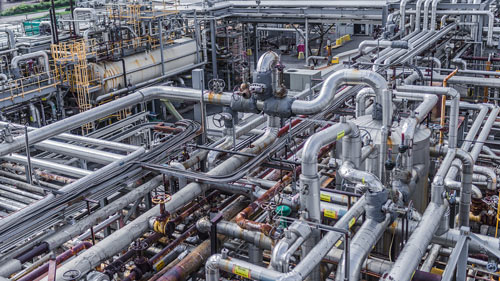
Mechanical Insulation
Mechanical insulation is a very specialized insulation that is engineered and designed to be applied to mechanical systems. Often confused with insulation that is designed for walls and ceilings but is quite different. Mechanical insulation will keep a designed engineered system to function at an operating temperature to ensure is optimize operations. Insulation installed incorrectly will result in loss of operating expenses, wasted energy and unnecessary harmful greenhouse gas emissions.
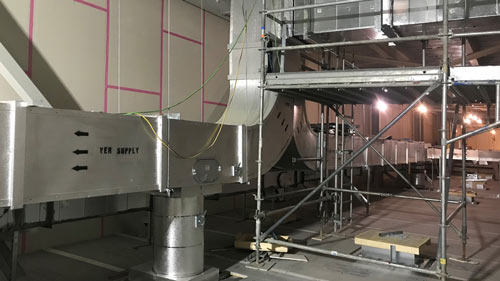
Maintenance / New Construction
Mechanical insulation is installed in new construction buildings/projects and can be found in existing buildings and facilities as well. It is imperative that the insulation is installed to the strict technical specification that were developed by engineers and inspected to ensure that the insulation was installed within compliance. Mechanical insulation must be maintained and inspected to ensure its effectiveness to the operational of the systems.
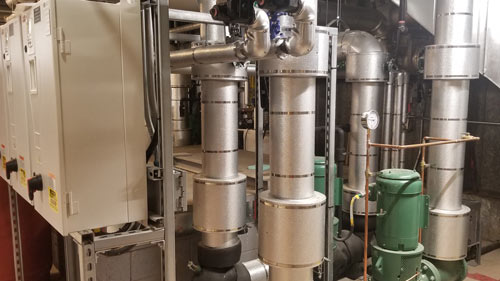
Industrial High Temperature
Extremely high temperature insulations require special attention due to its severity of it its operating thermal range. Any loss of heat can reduce operation of the system. The generation of heat is awful expensive, and the energy efficiency becomes paramount. New technologies with materials require the most highly trained workers to professionally install these products.
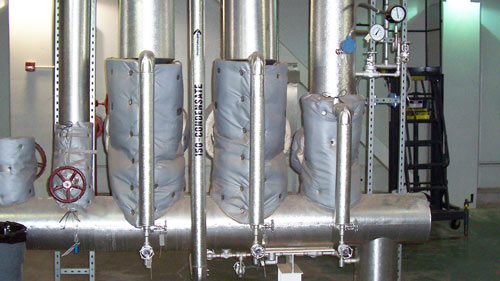
Pads and Blankets
These are becoming quite popular with high temperature system where access to the equipment is available. Typically used on flanged piped or equipment and still requires insulation or even offers personal protection. Removable and reusable pads offer a cost-effective solution to frequently serviced high temperature equipment.
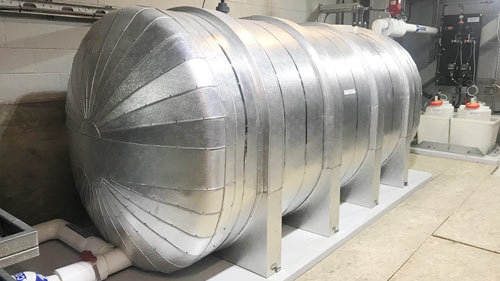
Storage Tanks and Vessels
Storage tanks and vessels sometimes require insulation as well. There are many applications that can be used. Traditional insulations or newer systems such as the vertical panels systems are utilized. Some contractors are highly proficient in these types of applications.
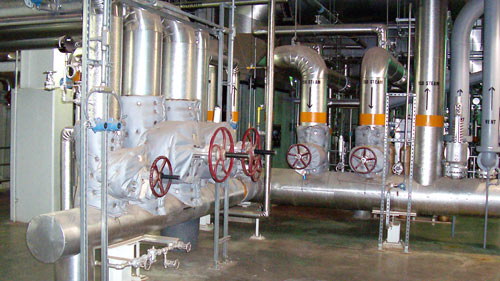
Boilers / Chillers
Both these units operated at the extreme of the temperature range of mechanical insulation. Each have their particular concerns that have to be addressed. The boiler has to be completely insulated to reduce the extreme heat loss. The chiller or refrigeration systems has a very special concern of vapor retarders and barriers that are needed to reduced condensation that can cause rust and bacteria.
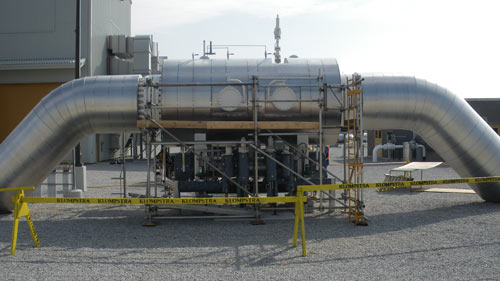
Metal Cladding / Weather Barriers
The metal, usually aluminum, is designed to offer a strong weather barrier to protect the insulation from rain, snow, ultraviolet rays and physical abuse. The metal jacketing offers an attractive appearance as well. The color is usually silver-like aluminum, or it could be painted to a desired color. Metal finish could be used indoor and outside.
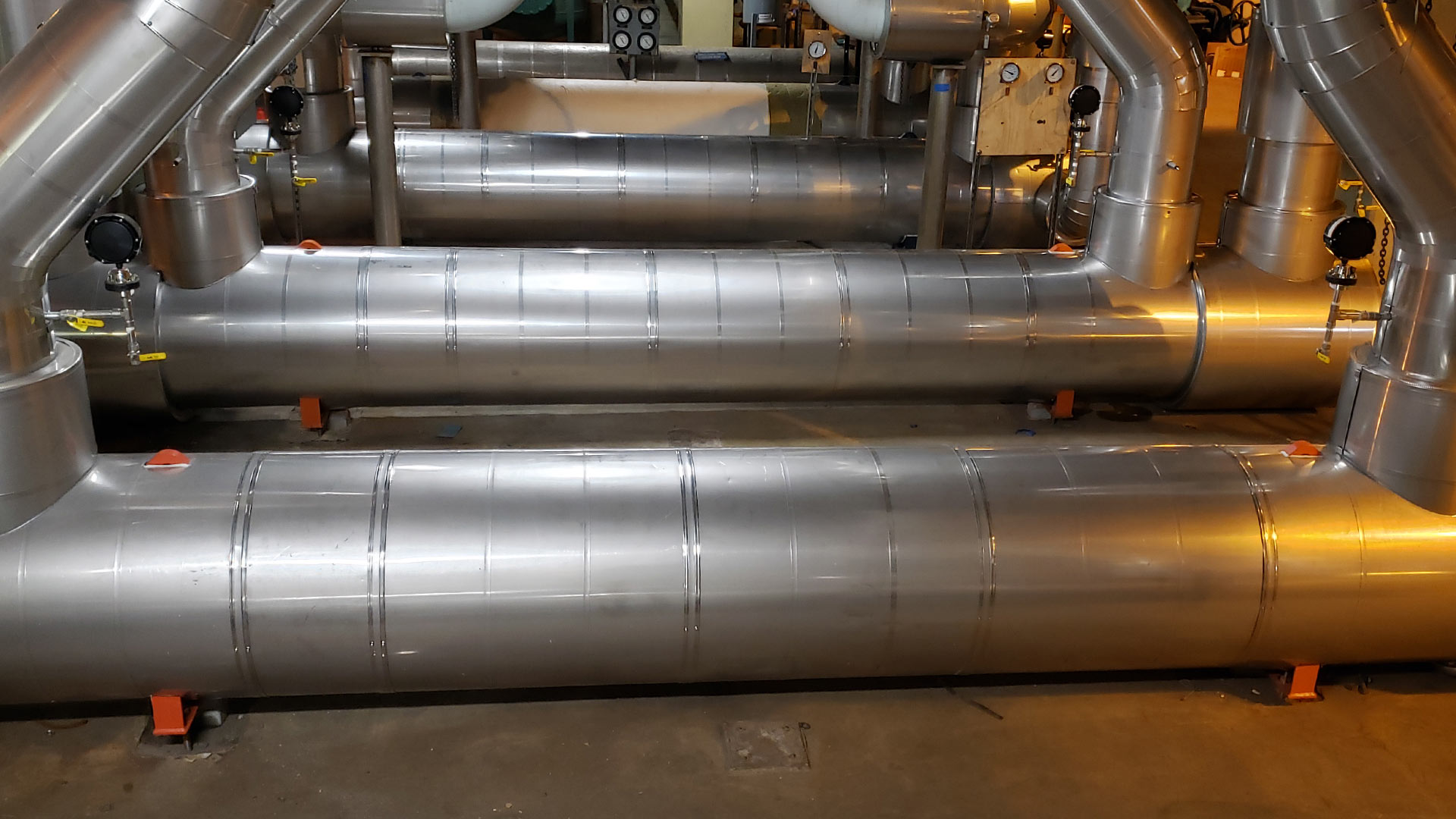
Commercial Heating and Cooling
There are literally miles of insulated piping in a typical building delivering hot water, recirculating hot water and cold domestic water. This is probably the most common type of mechanical insulation most people encounter. Also, quite common is to have some of this insulation missing which increases the operating cost of the building.
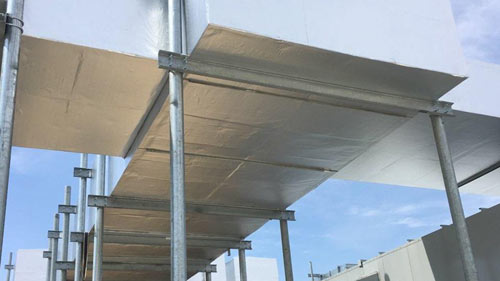
HVAC Systems
Heating, Ventilating, Air Condition (HVAC) system are used to heat and cool a building. The building’s delivery system can be a labyrinth of ductwork that supplies or returns the conditioned air to its desired location. Duct insulation must be properly installed and maintained correctly to ensure its vapor barrier capabilities or unfavorable conditions will develop. That condensation could spread to large distances potentially staining ceiling tiles and could lead to bacteria growth.

Vapor Retarders and Barriers
A little-known aspect of mechanical insulation that has huge effects with the insulation performance. This separates the hot insulation application to one that is cool or cold. Ever see your favorite beverage develop water on the outside of the can? Same thing with pipes and equipment if the vapor barrier is compromised in any way, it will condensate developing rust that limits the life of the system. If the insulation gets wet, it will not insulate and could lead into bacteria growth in the form of mold.

CUI Programs
Is a type of administrative concerns that addresses the lack of weather or vapor barriers to prevent Corrosion Under the Insulation, “CUI”. The industry has realized it is cheaper to ensure the insulation is professionally installed or maintained with a vapor barrier then to replace the pipe or equipment.

Mechanical Insulation Evaluations
Insulation can be inspected that offers a basic awareness of where the insulation system is deficient. Further investigation could lead into an energy audit that will calculate the result of missing insulation into a cost analysis in real dollars, energy wasted and emissions of harmful greenhouse gas emissions. This is a computer written factual report that could be used to plan a budget to address a facility’s insulation plan. Thermal photography can also be used that clearly shows the deficiencies of any insulation system. These evaluations will demonstrate on how properly installed or repaired mechanical insulations installations will have a return on investment, ROI, within 6 months to 2 years regardless of the size of the project.

Asbestos Abatement
For 100 years, Asbestos was used as insulation because it was a great insulator, but unfortunately it was determined that it is a carcinogen. Asbestos has not been used since the late 70s, it may still be in buildings built before 1980. Asbestos is harmless unless it is disturbed, many times the asbestos insulation is damaged for various reasons by people not knowing what they are working with. Mechanical insulation must be maintained and, in this case, remove the dangerous cancer-causing insulation and replaced with new state of the art insulation systems. Contractors are strictly licensed, and the work is highly regulated and inspected for the safety of the people who live or work in the building.
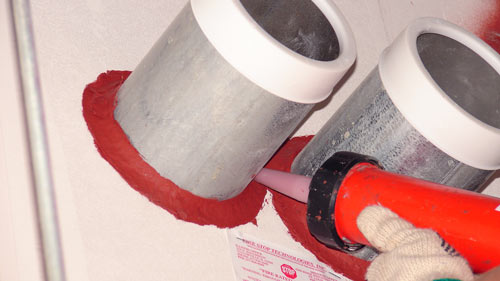
Fire Stop and Smoke Seal
Buildings are built to have fire rated walls that are designed to contain a fire if one does exist. This is part of the fire and building codes. Sometimes these fire rated walls are compromised by common construction procedures and penetrations that weaken the wall’s integrity and may permit fire or smoke to penetrate through the wall. A specialized contractor identifies these “weaken” areas and installs special materials to regain the wall’s fire rated barrier. The true value of this specialized industry is often realized after a building’s fire but then it is too late. This type of insulation has the potential to save lives, and it has.
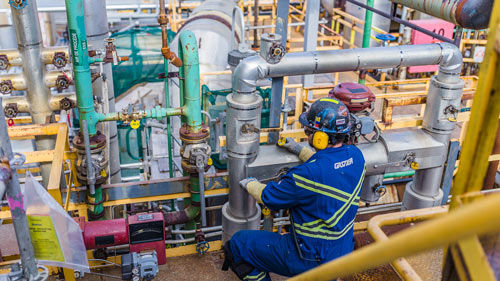
Nuclear Specialized Applications
Insulation in a Nuclear Power Plant is highly specialized. There are types of insulations and installation techniques that are required and differ than normal mechanical applications due to the Nuclear Regulatory Commission (NRC). Contractors that perform this type of work have the qualified workforce and are prepared to work in these plants governed by the NRC.

Specialized Insulations
There are many associated industries to mechanical insulation such as sound attenuation. Which is a form of insulation the reduces the transmission of sound. Insulation is also installed in the Maritime industry which is needed on ships. Lead and mold remediation is sometimes needed with the asbestos removal process. Mechanical insulation is used in many areas with many different purposes.

Highly Trained Workforce
The installation of mechanical insulation may appear simple, but it is not. Knowing the types and limitations of insulation to use and to be applied with an array of circumstances is rather complex. Union Mechanical Insulation contractors exclusively uses a workforce that are instructed through an intense Apprentice Program that is approved by the United States Department of Labor and the Canadian Provincial Government. The workers additionally receive updated training throughout their careers to keep them the most highly trained workforce in the world.

Safety Trained to Current Standards
The contractors and workers that are involved in mechanical insulations in the United States and Canada are trained with the latest safety technologies and training programs often exceeding the standard OSHA regulations.

















